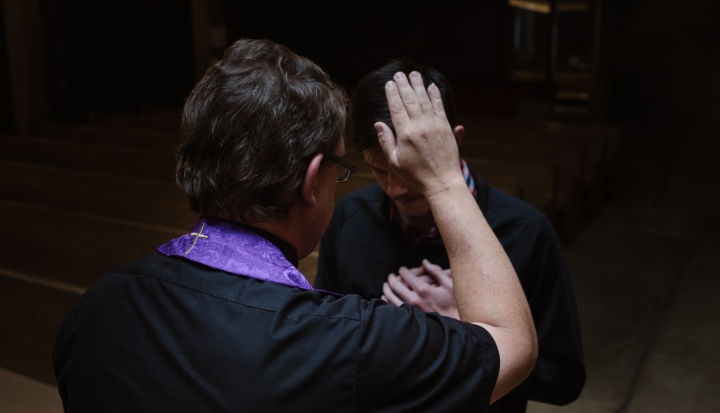1. Support people. An integral part of recovery for people with mental illness is to have a supportive faith community to rely on for their spiritual needs. Families also need support when dealing with the mental illness of a family member. The parish community can offer much through inclusive, non-judgmental, and unconditional love.
2. Be informed about the available resources in your community. People with mental illness and their families will often go to a clergy person and/or parish leaders first. It is important for clergy and leaders to listen with compassion and to know when to refer people to mental health professionals rather than to attempt to solve psychological problems themselves or dismiss the problem. It is also important to know where in the community one can refer people for competent professional help and services.
3. Incorporate specific prayers for those suffering with mental health issues into prayers at worship services. This lets a faith community know that the community prays and cares for people with mental illness. The prayer sends a welcoming message and lets people know that their community supports them.
4. Preach on the subject. Include references to persons with mental illness in homilies about social justice, caring for the poor, discrimination, and compassionate outreach to others. Avoid words or phrases in all sermons and communications that add to the stigmas against mental illness.
5. Give the peace and justice ministry the opportunity to get involved in the systemic problems surrounding mental illness. The failure of the mental health system to meet people’s basic needs is a moral issue. At least one half of the prison population and one third of people suffering from homelessness have some kind of mental illness. The nation’s community mental health system is underfunded and provides inadequate services. Mental health workers are generally not well paid for their work. What programs do exist often create a continuous cycle of crisis for people with mental illness and their families. All this is morally unconscionable.
6. Engage in political activism, either through letter writing or direct action. Since much of the problem with obtaining adequate care comes from the lack of funding for existing programs and decent wages for health care workers, state legislators are key to improving the system.
7. Include information about mental illness in the church bulletin or newsletter. This should be a series of articles rather than one or two. This not only keeps the information readable instead of giving parishioners too much to digest at one time, but it also keeps the issue in people’s minds instead of just making it a one-time thing.
8. Include mental illness in healing prayers and services (e.g., anointing of the sick). This gives a sign to the community that all illnesses are included in a parish’s care. Faith communities have to be particularly sensitive in this area, as there is a history of misguided prayer: Mental illness is not demon possession or God’s lack of love for us. It is a disease like any other.
9. Host speakers on the topic of mental illness. The Chicago Archdiocesan Commission on Mental Illness, The National Catholic Partnership on Disability, The National Alliance on Mental Illness (NAMI), the American Psychiatric Association, and the Mental Health Association are just a few of the good resources for information and speakers.
10. Institute a peer-to-peer ministry program. People with mental illness often do not have a circle of friends, and an important element to recovery and healing is a caring community. Peers don’t have to be medical professionals, but instead are people who are caring and able to listen. (Information on establishing a peer-to-peer program is available on NAMI’s website.)
11. Develop liturgies. Join with your diocese or other local faith communities to have an annual liturgical celebration of persons with a mental illness, their families, and mental health workers/professionals. This gathering should be celebratory and positive and include time after the liturgy to share fellowship and conversation.
12. Promote the dignity of the individual. God loves us each as we are. Use “people first language” (e.g., phrases like “people with a mental illness” rather than “the mentally ill”). No one wants to be known as a disease.
Adapted with permission from the Chicago Archdiocesan Commission on Mental Illness.
This sidebar accompanies our interview with Deacon Tom Lambert, founder of the Chicago Archdiocesan Commission on Mental Illness. It also appears in the March 2019 issue of U.S. Catholic (Vol. 84, No. 3, pages 28–32).
Image: Josh Applegate on Unsplash















Add comment